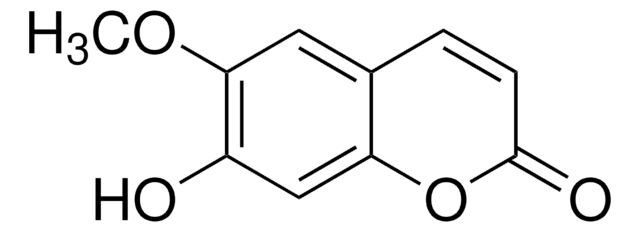Y0000687
Alverine citrate salt
European Pharmacopoeia (EP) Reference Standard
Synonym(s):
N-Ethyl-3,3′-diphenyldipropylamine, NSC 35459
About This Item
Recommended Products
grade
pharmaceutical primary standard
API family
alverine
manufacturer/tradename
EDQM
application(s)
pharmaceutical (small molecule)
format
neat
storage temp.
2-8°C
SMILES string
OC(=O)CC(O)(CC(O)=O)C(O)=O.CCN(CCCc1ccccc1)CCCc2ccccc2
InChI
1S/C20H27N.C6H8O7/c1-2-21(17-9-15-19-11-5-3-6-12-19)18-10-16-20-13-7-4-8-14-20;7-3(8)1-6(13,5(11)12)2-4(9)10/h3-8,11-14H,2,9-10,15-18H2,1H3;13H,1-2H2,(H,7,8)(H,9,10)(H,11,12)
InChI key
RYHCACJBKCOBTJ-UHFFFAOYSA-N
Gene Information
human ... HNF4A(3172) , HTR1A(3350)
Looking for similar products? Visit Product Comparison Guide
General description
Application
- Synergism with fluconazole against Saccharomyces cerevisiae and Candida albicans
- Efficacy of combination with simeticone on abdominal pain associated with irritable bowel syndrome
- Nutrient-sensitized screening for drugs that shift energy metabolism from mitochondrial respiration to glycolysis
- Drug effects viewed from a signal transduction network perspective
- Enhanced cytotoxic effect of proteasome inhibitor MG132
- Mechanism of action on phasic smooth muscles
Packaging
Other Notes
Storage Class Code
11 - Combustible Solids
WGK
WGK 3
Flash Point(F)
Not applicable
Flash Point(C)
Not applicable
Choose from one of the most recent versions:
Certificates of Analysis (COA)
Sorry, we don't have COAs for this product available online at this time.
If you need assistance, please contact Customer Support.
Already Own This Product?
Find documentation for the products that you have recently purchased in the Document Library.
Our team of scientists has experience in all areas of research including Life Science, Material Science, Chemical Synthesis, Chromatography, Analytical and many others.
Contact Technical Service





